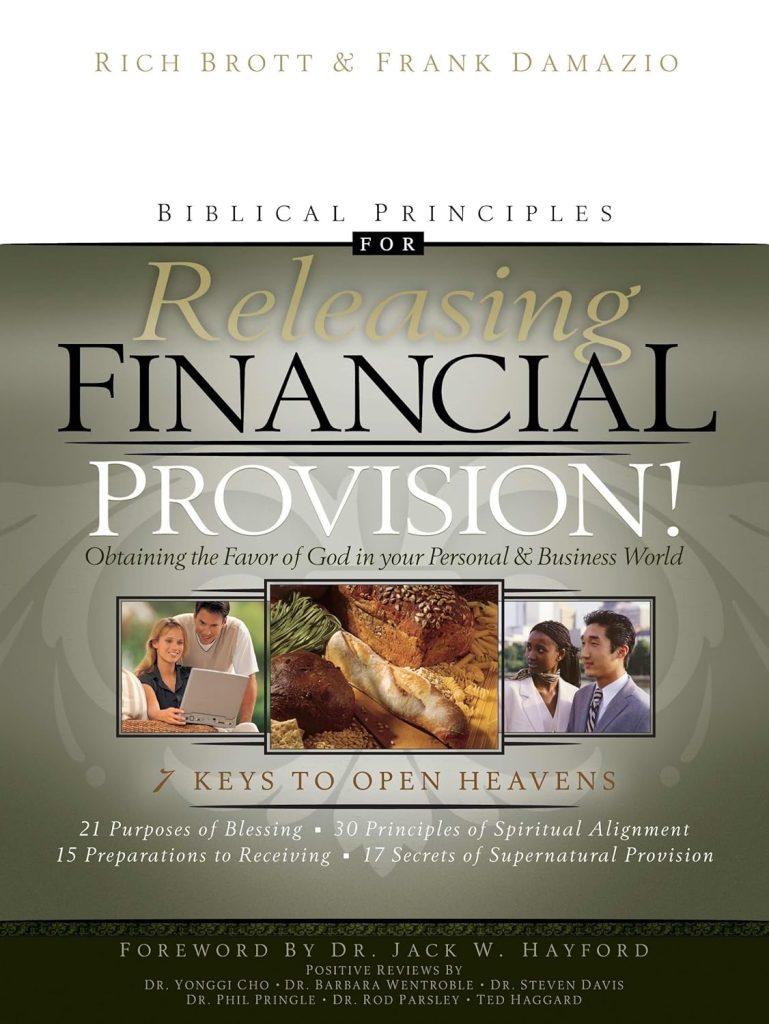Book Summary: Releasing Financial Provision
By Randell Tiongson on June 4th, 2025
A must read book!
Early this year, received a book assignment from my Pastor and friend, Dennis Sy. I was busy with school at Every Nation Leadership Institute when he gave me the book so he told me to read it after I’m done with my studies. As soon as I graduated from the program, I grabbed the book and started reading.
I realized that while I have read many books, I hardly write and publish what I learned from the book. I am making an exception on this one because the book was very insightful and helpful to me, so here goes!

More Than Money—It’s About Mission
One of the first things I appreciated about this book is that it isn’t just about money—it’s about purpose. Damazio and Brott don’t treat provision as a goal in itself, but as a by-product of living according to God’s will. And as someone who’s spent years teaching stewardship in a Filipino context, this resonates deeply. God doesn’t just bless us for our comfort—He blesses us so we can contribute to His kingdom.
1. Understanding the Source of Provision: God as Our Provider
The book begins with a strong biblical foundation: all provision ultimately comes from God. This isn’t just theology—it’s the posture of the heart.
“Every good gift and every perfect gift is from above…” (James 1:17, ESV)
As a personal finance advocate, I see many Filipinos place their trust in jobs, sidelines, or OFW remittances. While these are channels, they are not the source. One of the most transformative lessons I’ve personally embraced—and taught—is this: God is not limited by your circumstances.
Personal Application:
In seasons when income is low or expenses are high, we need to stop asking, “Where will the money come from?” and start asking, “What is God teaching me about trust?”
2. Recognizing the Purposes of Provision
Provision is never just for survival or prosperity—it’s for stewardship. Damazio and Brott lay out purposes such as:
- Providing for our needs
- Enabling generosity
- Advancing the gospel
- Supporting our family
- Demonstrating God’s faithfulness
As a Christian who teaches personal finance, I’m convicted that God’s blessings should always flow through us, not just to us. The goal isn’t to accumulate; the goal is to be a faithful conduit of God’s provision.
Personal Application:
When I teach budgeting, I now include a “generosity line” in every worksheet. It reminds us that giving is not an afterthought—it’s a design.
3. Hindrances to Financial Provision
The authors identify spiritual, emotional, and behavioral blockages that can limit provision:
- Unforgiveness
- Greed and selfishness
- Disobedience
- Fear and anxiety
- Poor financial management
As Filipinos, we often see financial lack as “kalooban ng Diyos” (God’s will), but this chapter challenges that mindset. Sometimes, lack is the result of unwise choices or spiritual disconnection. There is both a spiritual and a practical side to provision.
Personal Application:
I’ve seen Christians tithing faithfully, yet drowning in debt—because they never learned to budget or say no to lifestyle inflation. Provision requires partnership with God and personal responsibility.
4. Principles of Releasing Provision
This is the heart of the book. Provision is released through faith, obedience, and stewardship. Some key principles:
- Sow generously (2 Cor. 9:6–8)
- Honor God with the firstfruits (Prov. 3:9–10)
- Live righteously and uprightly (Psalm 84:11)
- Seek the kingdom first (Matt. 6:33)
These are not formulas but faith responses. Provision isn’t earned like a salary—it’s received through alignment with God’s ways.
Personal Application:
In my own life, I’ve had moments when I obeyed God financially—like blessing someone sacrificially—and saw unexpected provision come in. God is not a vending machine, but He honors obedience rooted in faith.
5. The Role of Work, Wisdom, and Strategy
Damazio and Brott also highlight the practical channels of provision:
- Diligent work (Prov. 14:23)
- Wise planning (Prov. 21:5)
- Faithful stewardship (Luke 16:10)
This aligns beautifully with what I’ve taught for years: Faith and finance must walk together. You cannot pray for provision while mismanaging what you already have. God multiplies what’s placed in His hands—but He still expects us to plan and work.
Personal Application:
I tell young professionals all the time—stop waiting for financial miracles if you’re wasting your salary. Stewardship is your seed; diligence is your fertilizer.
6. Declaring, Praying, and Believing for Provision
This chapter encourages boldness in prayer and proclamation. While it could lean into what some call “prosperity teaching,” the authors remain biblically grounded. It’s not about demanding from God—it’s about aligning our prayers with His promises.
Personal Application:
I now start my day with a declaration of Psalm 23:1 – “The Lord is my Shepherd; I shall not want.” Not because it’s magic, but because it sets the posture of my heart.
7. Living in the Flow of Divine Provision
Provision isn’t just about crisis moments—it’s about a lifestyle. Damazio and Brott envision Christians living in a flow of grace, where their needs are met and they are free to give, serve, and build.
Personal Application:
This is the ultimate goal of financial discipleship—not just financial peace, but financial purpose. I don’t just want to be debt-free; I want to be kingdom-free—free to go, give, and grow God’s mission.
Conclusion: Provision with Purpose
This book reinforced a key truth: God wants to provide, not just to sustain, but to empower. As someone who’s seen lives change through simple financial wisdom paired with biblical truth, I believe this message is needed now more than ever—especially in the Philippines, where poverty and abundance can exist side by side.
If you’re a pastor, provider, professional, or even just someone trying to make sense of your finances—Releasing Financial Provision! will help you think rightly, live wisely, and give freely.


Where can I buy the book?